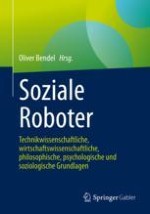2021 | OriginalPaper | Buchkapitel
25. Soziale Roboter im Bildungsbereich
Konzeptioneller Überblick zum Einsatz sozialer Roboter in der Bildung
verfasst von : Sabine Seufert, Josef Guggemos, Stefan Sonderegger
Erschienen in: Soziale Roboter
Verlag: Springer Fachmedien Wiesbaden
Aktivieren Sie unsere intelligente Suche, um passende Fachinhalte oder Patente zu finden.
Wählen Sie Textabschnitte aus um mit Künstlicher Intelligenz passenden Patente zu finden. powered by
Markieren Sie Textabschnitte, um KI-gestützt weitere passende Inhalte zu finden. powered by
